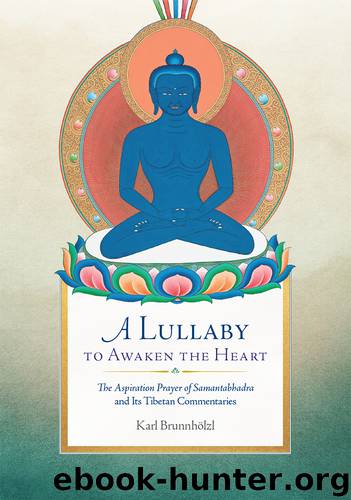A Lullaby to Awaken the Heart by Karl Brunnhölzl

Author:Karl Brunnhölzl
Language: eng
Format: epub
Publisher: Wisdom Publications
Appendix 7
The Many Facets of the Single Freedom
The teachings of the Great Perfection discuss a number of sets of three, four, and five “modes of freedom.”
The Three Modes of Freedom
“The three modes of freedom” consist of (1) being free upon arising (Tib. shar grol), similar to a person recognizing an old friend in a crowd of people; (2) being free in itself (Tib. rang grol), similar to a snake uncoiling and untying its own knots; and (3) being free without benefit or harm (Tib. phan med gnod med du grol ba), similar to a thief entering an empty house.604
The Four Modes of Freedom
The most common set of “the four great modes of freedom” usually includes being (1) primordially free (Tib. ye grol), (2) free in itself, (3) nakedly free (Tib. gcer grol), and (4) free from extremes (Tib. mtha’ grol). Sometimes being free upon arising, being completely free (Tib. yongs grol), or being free as one (Tib. gcig grol) replace one of the other four kinds of freedom (usually, freedom from extremes) or are added to this list (thus making five; see below).
On “the four great modes of freedom,” Jamgön Kongtrul’s TOK605 says the following: (1) Awareness is primordially free because its own face is not tainted by any saṃsāric phenomena whatsoever since beginningless time, and thus all causes for appropriating saṃsāric existence are exhausted right from the start. (2) It is free in itself because, without being fixed or contrived by any remedy whatsoever, everything that arises is like a knot in a snake that dissolves on its own and thus does not depend on any other means for being free. (3) It is nakedly free because all eight kinds of consciousnesses are naturally free without any duality of subject and object in an instant with great lightning-like suddenness. (4) It is free from extremes because it does not abide in the three times or as any knowable object. Self-arising wisdom—one’s own awareness that abides within the natural state of these four great modes of freedom—is the distinctive feature of this path of the Pith Instructions Series.
The Great Tibetan-Chinese Dictionary606 says that these four constitute the four great modes of awareness’s freedom as the dharmakāya, which is an instruction of Cutting through Solidity. (1) Since time without beginning, self-arising awareness itself is untainted in its own essence by any saṃsāric phenomena whatsoever, and therefore all substantial causes of saṃsāric existence are exhausted from the start. Hence, it is called “primordially free.” (2) In its own essence, this very self-arisen awareness is not mended (or contrived) by any remedy whatsoever—without depending on anything else, it allows everything that may arise to be free (Tib. ’grol byed), just as the knots in a snake come undone on their own. Hence, it is called “free in itself.” (3) Within self-arisen awareness, all cognitions of the eight collections of consciousness are naturally free with great lightning-like suddenness in the single instant of the duality of subject and object falling away. Hence, it is called “nakedly free.
Download
This site does not store any files on its server. We only index and link to content provided by other sites. Please contact the content providers to delete copyright contents if any and email us, we'll remove relevant links or contents immediately.
The Way of Zen by Alan W. Watts(6589)
Ego Is the Enemy by Ryan Holiday(5404)
The Art of Happiness by The Dalai Lama(4118)
The Book of Joy by Dalai Lama(3965)
Why Buddhism is True by Robert Wright(3439)
Spark Joy by Marie Kondo(3292)
Shift into Freedom by Loch Kelly(3190)
Happiness by Matthieu Ricard(3037)
A Monk's Guide to a Clean House and Mind by Shoukei Matsumoto(2901)
The Lost Art of Good Conversation by Sakyong Mipham(2638)
The Meaning of the Library by unknow(2557)
The Unfettered Mind: Writings from a Zen Master to a Master Swordsman by Takuan Soho(2291)
The Third Eye by T. Lobsang Rampa(2255)
Anthology by T J(2202)
Red Shambhala by Andrei Znamenski(2180)
The Diamond Cutter by Geshe Michael Roach(2056)
Thoughts Without A Thinker: Psychotherapy from a Buddhist Perspective by Epstein Mark(2007)
Twilight of Idols and Anti-Christ by Friedrich Nietzsche(1886)
Advice Not Given by Mark Epstein(1873)
